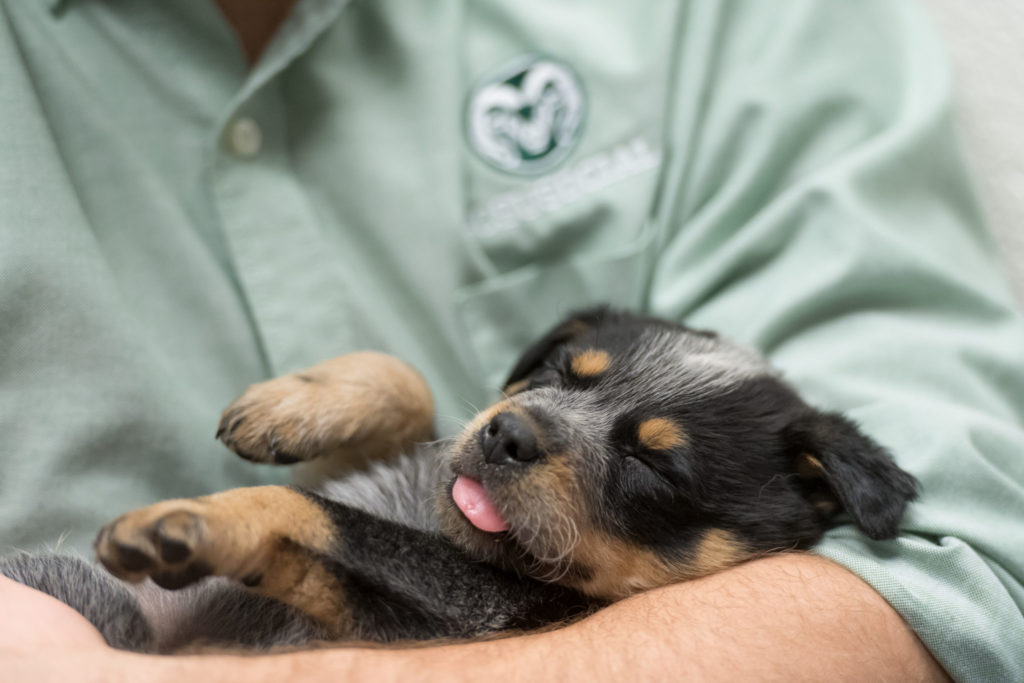UPDATE May 14, 2020: Research into COVID-19 transmission is ongoing, and this story from March 23 will be updated as we learn more. The World Small Animal Veterinary Association (WSAVA) posts updates for veterinarians on its COVID-19 Advice and Resources page. In addition, the International Society for Companion Animal Infectious Diseases (ISCAID) posted a review of the feline issues associated with this virus. Here is a summary of feline-specific guidance from CSU, the Centers for Disease Control and Prevention, WSAVA, and ISCAID:
- The exact source of the current outbreak of coronavirus disease 2019 (COVID-19) is unknown, but is believed to have come from an animal source.
- The SARS-CoV-2 virus that causes COVID-19 has spread from some owners to their cats. To put this risk into perspective, while there have been over 4 million human cases to date, only 6 pet cats and 4 pet dogs have had confirmed infections.
- Cats can be experimentally infected with SARS-CoV-2 but pass the virus for less than 2 weeks just like most people.
- At this time, there is no evidence that companion animals play a significant role in spreading SARS-CoV-2 to people.
- If you develop COVID-19, minimize contact with your pets and other family members and have everyone shelter at home for 14 days.
- There is no reason to relinquish your small companion animal because of this virus.

Note: This article was adapted from the World Small Animal Veterinary Association on March 23, 2020.
Veterinary experts from around the world are urging pet owners to listen to the advice of their veterinarians and public health experts, following the news that a dog in Hong Kong, quarantined after it had tested positive for SARSCoV-2, has died. The dog had been released after two weeks of quarantine and subsequently tested negative for the virus.
The dog, a 17-year-old Pomeranian, had shown no clinical signs of COVID-19. However, it did have unrelated health problems and is believed to have passed away due to old age. There is no evidence that the dog contracted COVID-19, nor that it could have passed the virus to another human or animal.

Dr. Michael Lappin, professor of infectious disease at the CSU James L. Voss Veterinary Teaching Hospital and chair of the World Small Animal Association’s One Health Committee, and Dr. Mary Marcondes, co-chair of the association’s Scientific Advisory Committee, recommend that veterinarians remind owners to:
- keep companion animals with them if they are self-quarantined
- maintain good hygiene practices, including washing hands when interacting with pets
- arrange care for any animals left at home with family or friends should they be hospitalized
- contact their veterinarian immediately if they have questions or concerns.
The association’s Scientific Committee and One Health Committee have worked together to provide advice to its members and pet owners.
On March 19, the Agriculture, Fisheries and Conservation Department in Hong Kong announced that a second dog, a German Shepherd, had also tested positive for SARS-CoV-2. The dog was quarantined after its owner was confirmed with COVID-19. Although the dog has tested positive, it has no clinical signs of disease. Another dog from the same residence has tested negative for the SARS-CoV2. It also has no relevant clinical signs and has been quarantined. The dogs will continue to be tested for the remainder of the quarantine period.
“While there is still much we don’t know about COVID-19, we do know that the Pomeranian dog did not die from the virus, and the second dog is also showing no signs, either of the disease or of being able to transmit it to other pets or people,” said Dr. Shane Ryan, president of the World Small Animal Association. “The current evidence still strongly indicates that COVID-19 cannot be contracted from pets.”
The association says its priority is to support its member veterinarians who care for companion animals around the world and it urges pet owners not to panic and, instead, to continue to care for their companion animals and to enjoy their company. In difficult times, such as these we face today, pets can play a very positive role, providing companionship to the isolated and lonely.
On March 13, IDEXX Laboratories announced that it had evaluated thousands of canine and feline samples during the validation of a new veterinary test system for SARS-CoV-2 and had seen no positive results.
“We remain very concerned at reports of many animals being abandoned, killed or taken to shelters because their owners fear that they might carry the virus when this is not supported by evidence,” said Ryan. “In addition to the suffering this causes to the animals concerned, their owners will also cease to benefit from all the positive aspects of owning a pet, which are even more important as so many of us are now having to limit contact with other people.”
The WSAVA represents more than 200,000 veterinarians worldwide through its 113 member associations. Its core activities include the development of WSAVA Global Guidelines in key areas of veterinary practice, including pain management, nutrition and vaccination, and the provision of continuing education.